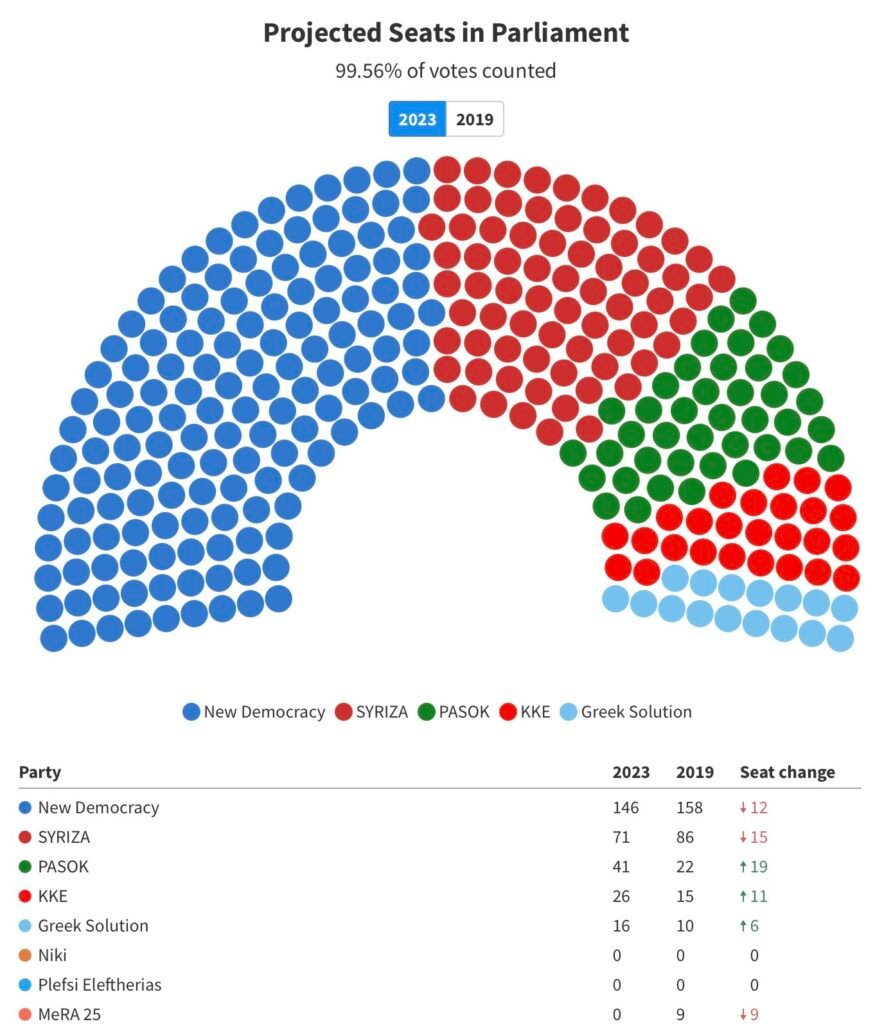Kyriakos Mitsotakis, the conservative prime minister of Greece, has emerged victorious in the national elections, declaring his party’s triumph as a “political earthquake.” The centre-right New Democracy party garnered nearly 41% of the vote, falling just five seats short of a majority.
Mitsotakis’ centre-left rival, Alexis Tsipras, graciously congratulated him, while his own Syriza party faced a disappointing outcome, securing only 20% of the vote. Mitsotakis interpreted the results as a mandate from the Greek people for his party to form a four-year government.
In his victory speech, Mitsotakis stated, “The people have chosen a Greece governed by a majority government led by New Democracy, without the assistance of others.” Supporters of the New Democracy party in Athens erupted in cheers upon hearing the initial exit poll results, which highlighted the unexpectedly large scale of their victory. As the final results unfolded, it became evident that pre-election polls had underestimated the significant 20-point difference between the two main parties.
Although New Democracy won 146 seats, they fell just short of the 151 seats required for a majority in the 300-seat parliament. An interior ministry vote map displayed all but one of Greece’s electoral districts colored in the signature blue of New Democracy. Mitsotakis’ remarks indicated that he would not seek a coalition with another party but rather opt for a second election in late June when the winning party is granted bonus seats.
Greek President Katerina Sakellaropoulou will offer Mitsotakis the opportunity to form a coalition, which he is likely to decline. She will then extend the offer to the next two parties in line. If that fails, she will arrange a caretaker government until new elections can be held.

The election outcome dealt a severe blow to Syriza leader Alexis Tsipras, who referred to his party’s performance as “extremely negative.” Tsipras came to power in 2015 on a platform opposing the austerity measures imposed by international creditors, but eventually succumbed to their demands.
The centre-right has governed Greece for the past four years, and they proudly highlight the country’s nearly 6% economic growth last year. Mitsotakis campaigned on the premise that only he could be trusted to steer the Greek economy forward and solidify the recent growth. The Greek people seem to have responded positively, surpassing expectations.
Giorgos Adamopoulos, a 47-year-old New Democracy voter in Athens, expressed his support for Mitsotakis, stating that Greece deserved better politics and that he was impressed with the prime minister’s track record during his four years in office. In the past, winning 41% of the vote would have secured a majority in the Greek parliament. However, recent changes stipulate that a winning party now requires over 45% due to the elimination of a 50-seat bonus in the first round, making a second election more likely.

Mitsotakis has his sights set on the additional seats that would come with winning a second election. A majority government would grant him four years in power, enabling him to assemble a cabinet of his choice. If he were to consider coalition talks, Pasok, a socialist rival to Syriza, could be a potential partner as they enjoyed a significant victory in the election, securing 11.5% of the vote.
However, forming a coalition could prove challenging due to a wiretap scandal involving Pasok leader Nikos Androulakis last year. The scandal resulted in the resignation of Mitsotakis’ nephew, who served as the prime minister’s chief of staff, as well as the head of Greek intelligence.











